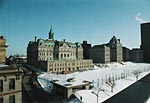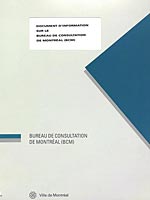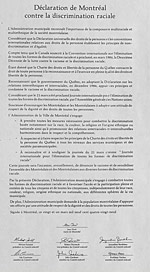

First years of the MCM at city hall
The democratization of political institutions and the decentralization of the municipal government were among the priorities of the new team in power. The executive committee adopted two unprecedented principles, namely collegial structure and responsibility of members. Each councillor was in charge of specific projects. Jean Doré picked three women and three men to form the new executive committee, headed by Michael Fainstat.
Under Act 105, the public was entitled to question city council members, but it was a rather complex procedure. Citizens first had to submit their questions in writing 10 working days before each meeting. The Administration reserved the right to determine the admissibility of all questions. In addition, the chairman of the executive committee could refuse to answer questions without providing any explanation.
As of 1986, that procedure was greatly modified. Both oral and written questions were allowed at the beginning of each city council meeting. Citizens were simply required to register 15 minutes before each meeting.
The decentralization policy of the Doré-Fainstat Administration bore on three aspects. The city of Montréal established 9 districts, each one grouping several municipal districts. Thirteen Accès Montréal offices were set up in 1987 to improve communications between the Administration and citizens. Services hitherto available only at city hall were now provided in each district.
In 1988, the spotlight was turned on public consultations. The Administration put forward a proposal for the establishment of district advisory committees, the Bureau de consultation de Montréal, and standing committees.
Nine district advisory committees were set up in 1989 for the purpose of providing the executive committee with recommendations ranging over a great many projects such as zoning changes, road closures and demolition of residential buildings. Committees were made up of councillors in each district, who met ten times a year. Citizens could exercise the right to freely express their views on current issues.
The Bureau de consultation de Montréal, also set up that same year, reviews major projects and master plans. One of the main issues concerned the development plan of Mont-Royal Park. Public information and consultation sessions are still held on a regular basis. As is the case for district advisory committees, its mandate is determined by the executive committee.
Six standing committees were established: Administration and Quality of Services Committee, Planning and Housing Committee, Culture and Community Development Committee, Economic Development Committee, Environment and Public Works Committee, Ethics for Members of Council.
All committees hold public meetings in their respective areas of activity. They are empowered to open files on specific matters, which are in turn entered on the work plans submitted to city council each year.
In November 1990, Jean Doré was re-elected mayor with a majority of 59%. Some 41 MCM candidates were elected, 15 of whom being women. The other political groups shared the nine remaining seats. The 1990 election marked a clear victory for the MCM.
The democratization process made great strides over the last 20 years. The adoption of universal suffrage and the official recognition of municipal parties gave rise to numerous reforms that consolidated the political structure.
The 1990s will pave the way for a new sharing of responsibilities at all government levels, which should in turn revive the interest of citizens in public issues. The municipal government is called upon to play a major role in that regard and must meet the great challenge of inciting Montrealers to become more involved in local political life. The active participation of citizens represents the best guarantee of the vitality of the democratic process.





















